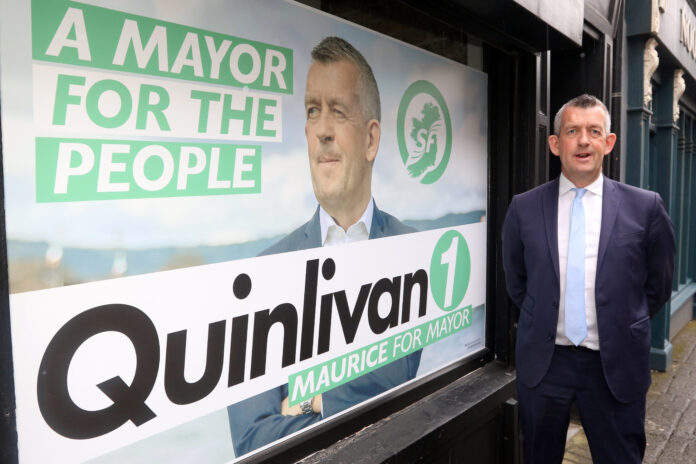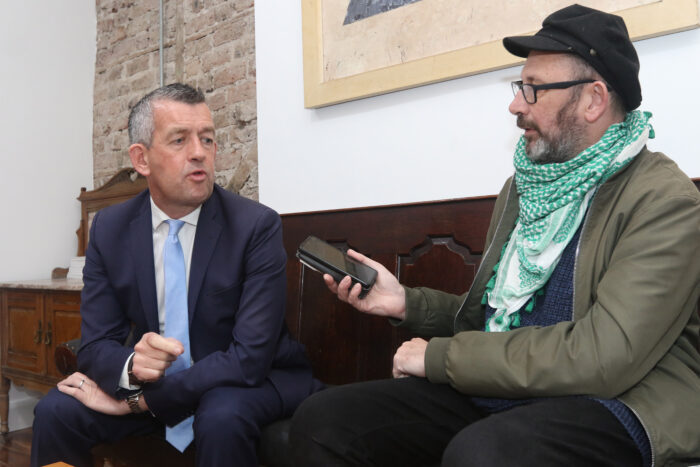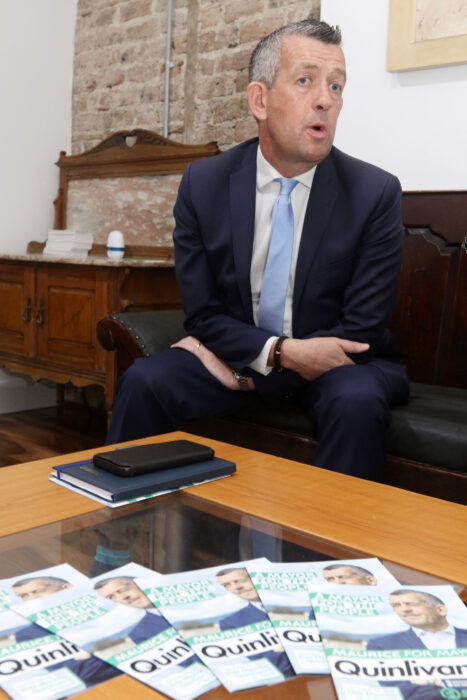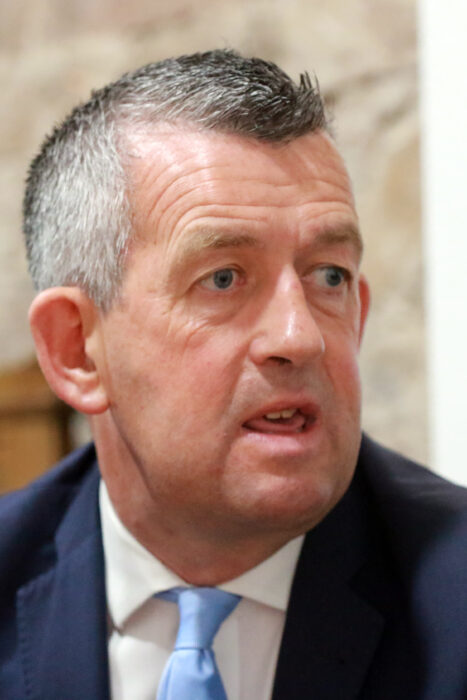
SINN Féin TD Maurice Quinlivan believes the new directly-elected mayor role is a huge opportunity to foster a ‘Minister for Limerick’ position. And no better man than he, he insists, to be the first Minister for Limerick and usher in new and extended powers.
“Obviously we are all going to say this, but I definitely believe I am the best candidate,” Deputy Quinlivan told the Limerick Post at his Ellen Street campaign office.
“I think this is an opportunity for Limerick to seize this opportunity and develop this role. It’s a new role and, if we get it right, I have no doubt that other places like Portlaoise, Waterford, Cork, and Galway will follow. There is additional funding coming from Dublin, which is good, so there will be a big discretionary fund to spend over the next five years.”
Maurice says that, if he is elected, he “will definitely spend at least one day each week in the communities talking to community groups, community services, whether they are in villages or towns, from Ballysteen to Ballynanty, where I grew up. I will treat everyone the same.”
The Sinn Féin politician says that the community groups he has met with so far on the campaign trail see where a directly-elected mayor can help strengthen strong communities while giving better support to communities in need of a leg up.
“I believe this is a real opportunity for somebody to develop this role from what it’s come from. I want to be the mayor for the people. I am one of their own and I want to make sure Limerick gets a fair deal and that I can become like a Minister for Limerick,” he tells me.
“Hopefully in a year or so I will be dealing with a new government which will have a Sinn Fein minister in it, and I believe the Minister for Local Government, as Mary Lou has committed to, will develop more powers to develop the role and give more powers to the mayor.”

Limerick has to much potential
The sitting Dáil Deputy points out that his track record in Limerick includes managing a business, serving as a councillor, a TD, and party spokesperson, from enterprise to workers’ rights, trade, and employment.
He says he strongly believes that Limerick has so much potential – but potential that must be unlocked by delivering meaningful change for the people who live and work here.
“It is worth reminding people that when they voted for a directly-elected mayor in 2019, nearly half the people in Limerick didn’t vote for this position. It’s worth remembering that those people’s concerns need to be taken on board, but those who did vote for it were voting for what they thought would be a different mayor, a stronger mayor with more powers.
“After the plebiscite in 2019 we were assured at the time that we would get additional powers and that the mayor’s role would be more enhanced. The legislation, and I have said this in the Dáil, and I used my words carefully at the time, but it was a missed opportunity. It can be done better but we can develop this role.
“We put down a whole load of amendments to the Mayor Bill to devolve powers to the mayor. A Sinn Féin minister will deliver those powers around policing, land acquisition – where the mayor can even buy land – look at bringing municipal waste back under the council so services are owned by the local authority. That has been an unmitigated disaster across the city and county since we privatised that.”

Working the the community
Turning his attention to housing, he tells me that people need affordable housing solution to the current crisis.
He also wants to see the regeneration of both city and county towns and villages through investment in communities, and a plan to deliver quality job opportunities to ensure businesses and the tourism sector can thrive.
Deputy Quinlivan insists that what people really need is to see change delivered.
“They need a mayor with the track record and determination to ensure genuine and meaningful change for workers, families, and communities across Limerick. As a mayor for all the people of Limerick, I would work tirelessly to deliver this change,” he promises.
“The mayor has the statutory role to meet ministers on an annual basis, which is very important, but it is also very important to work with groups like Limerick Twenty Thirty to get these projects over the line. We will work with the Local Enterprise office here in Limerick and develop to see what support we can give them and what support they can give the new mayor.”

‘People are telling me they don’t feel safe’
One of the issues, Deputy Quinlivan claims, that isn’t being done right in Ireland is accessing grants in Europe. He wants to make sure that Limerick City and County Council has an office dedicated to this.
As our conversation wraps up, Maurice is headed to meet with local business groups regarding the city centre, which he says is becoming a number one concern on the doorsteps.
“People are telling me they don’t feel safe coming to the city centre, and it’s not just that they don’t feel safe, they feel it is not a nice experience,” he says.
“There’s a lot of stuff that needs to be done. What I would be doing if I was the mayor is talking to people like the Ana Liffey Drug Project and Novas to see how we can deal with the wonderful people that are on our streets.”
His priority, he tells me, “would be to get those people off the streets and secure accommodation which I think the council is capable of doing”.
“That will solve some of the problem. The other thing people are asking me is ‘what’s the point of going into the city centre? There’s not much to go in for anymore’. There’s no unique selling point.
“We do have to acknowledge that we are struggling since the closure of Debenhams and other stores. We really need something unique in the city centre. I will be looking at community type music events in the city centre and villages and towns supported by the council and local businesses working together.
“I would hit the ground running fast if elected to make positive change. I was on the council for seven years, I know most of the council officials and I know how they work. This is a huge opportunity which I hope to grab from day one.”


